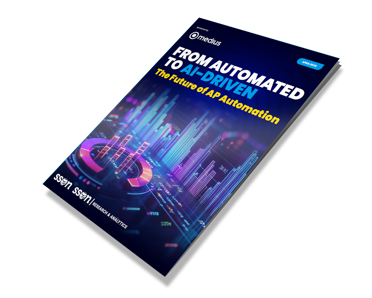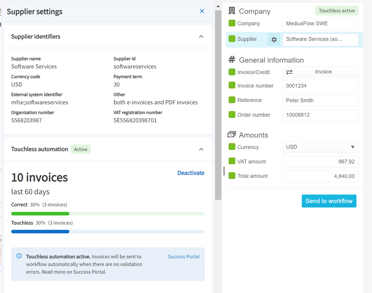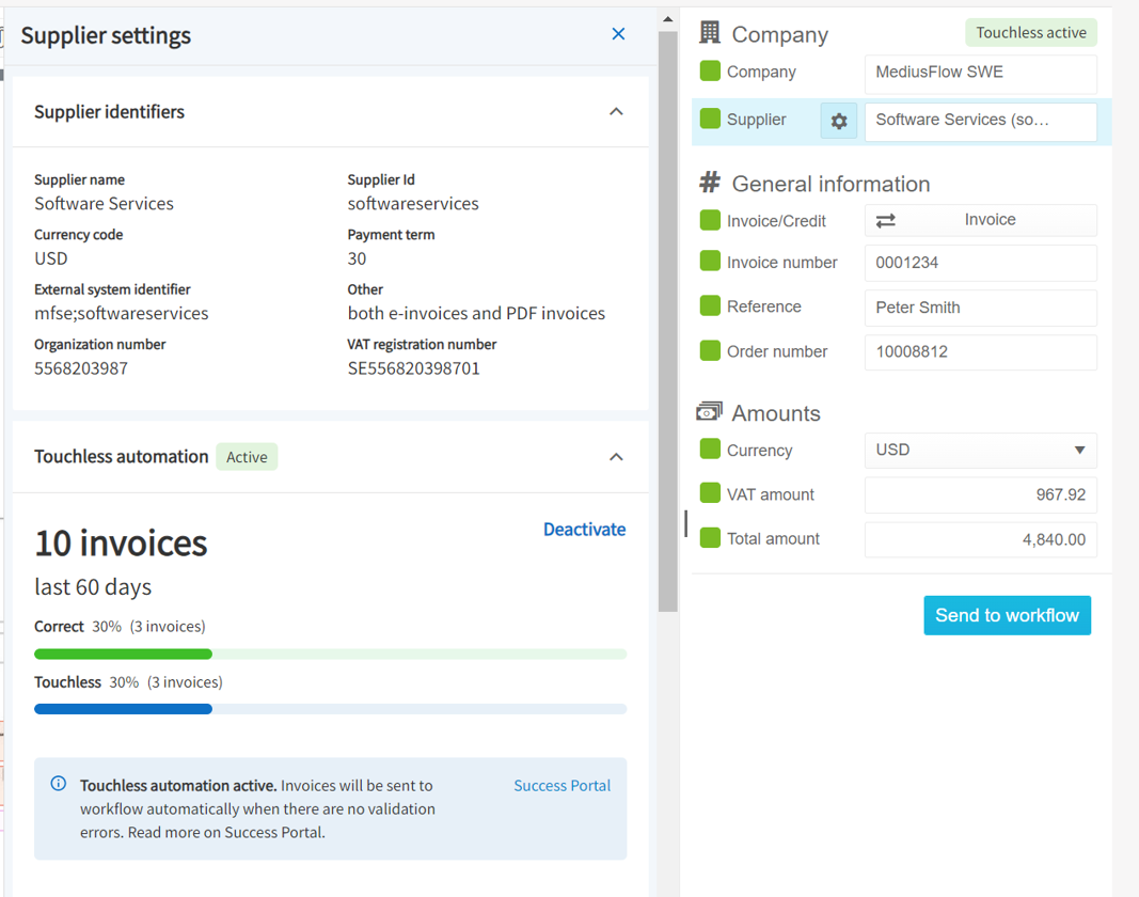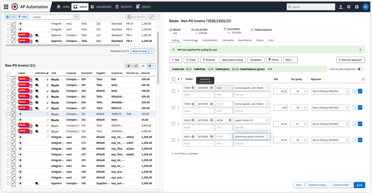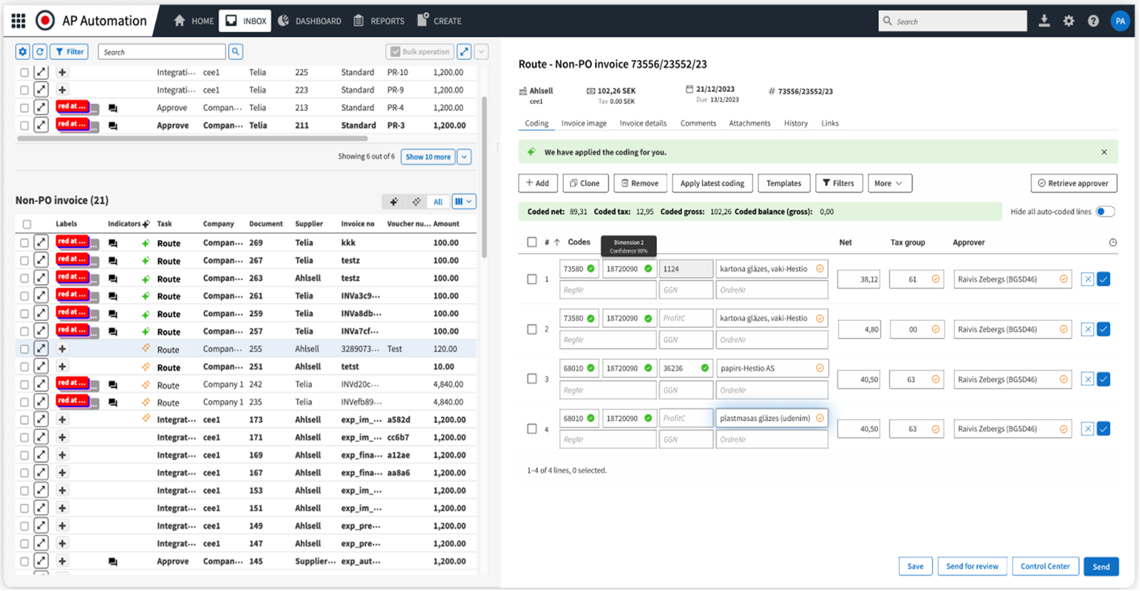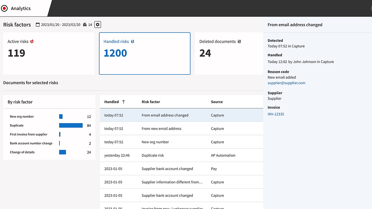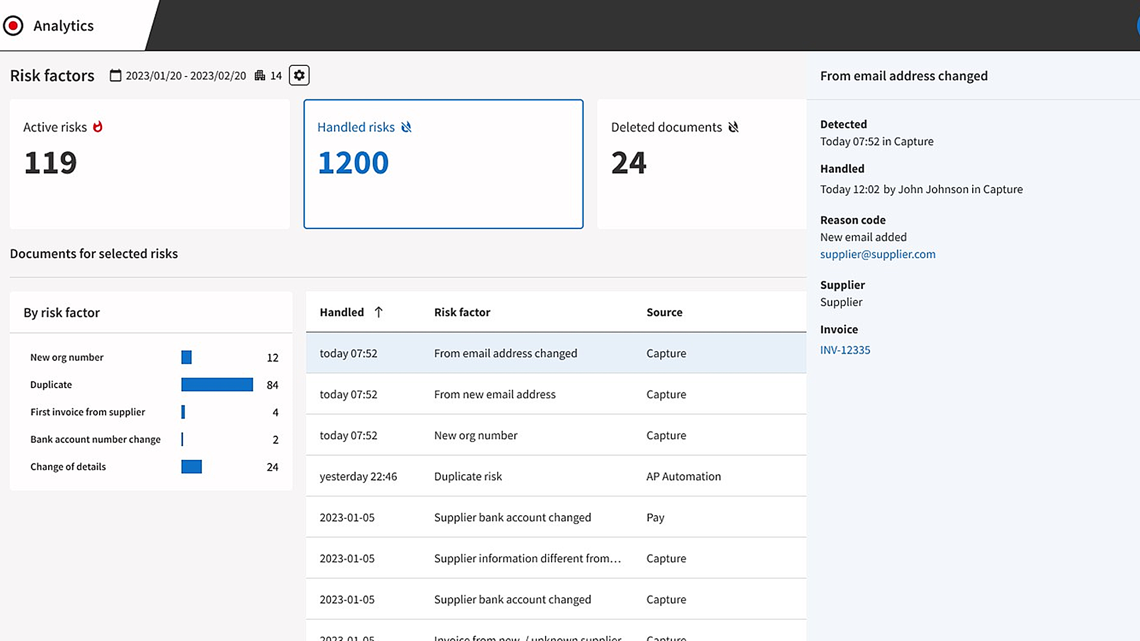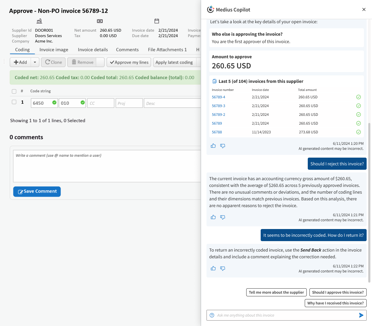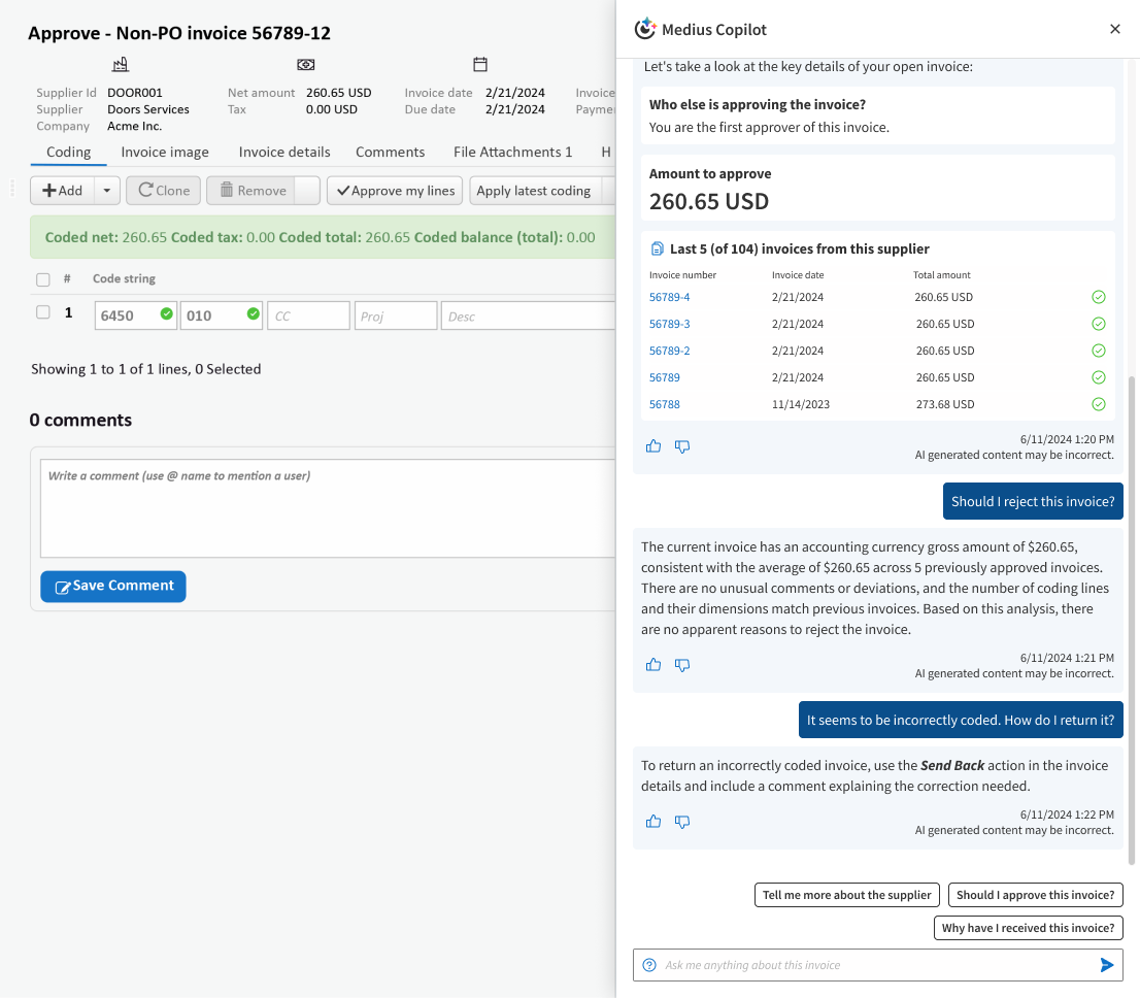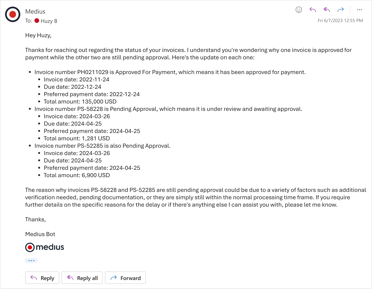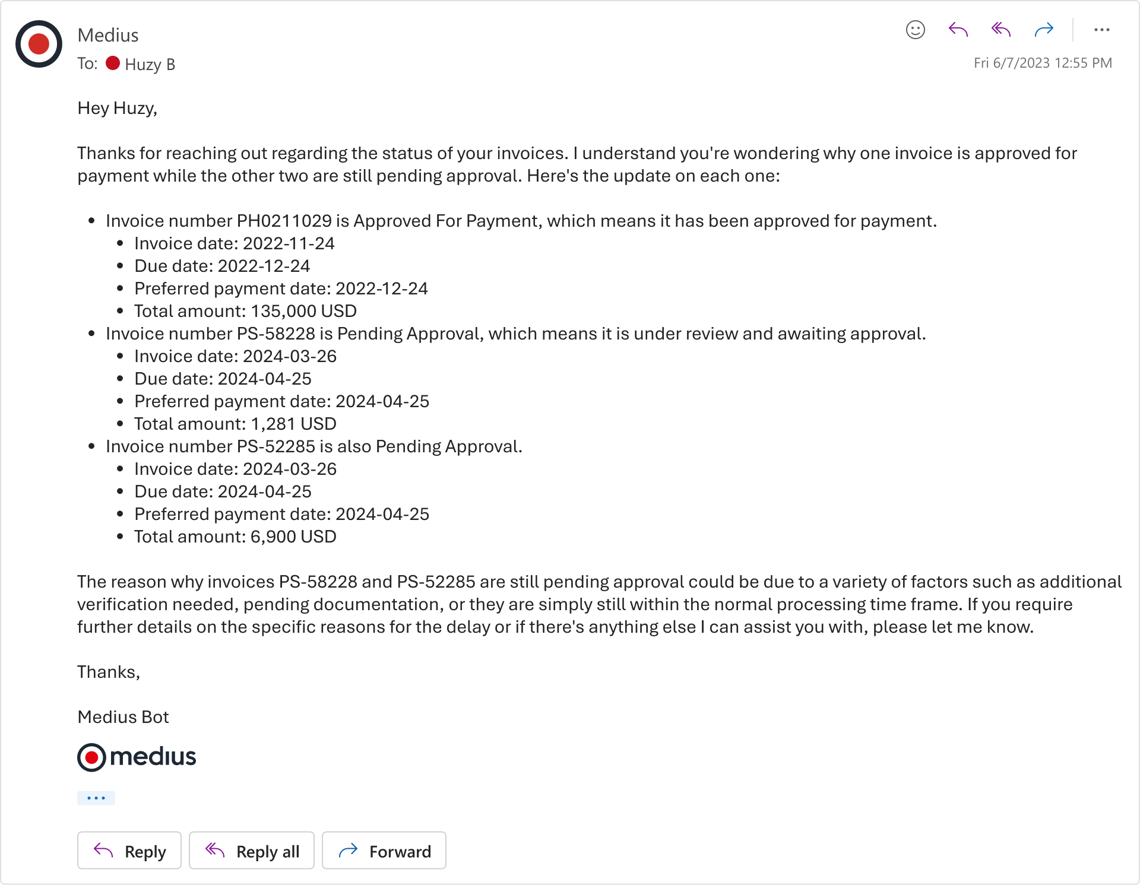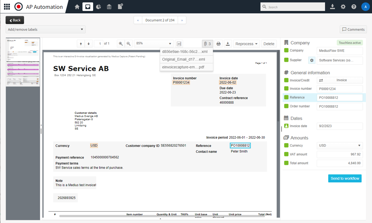

Agentic AI refers to artificial intelligence systems that can make decisions and take actions autonomously, without human input or oversight. It learns and acts based on predefined goals, rules, or learned behavior.
Unlike traditional AI, which provides recommendations or insights, agentic AI goes a step further. It acts on those insights without needing a human to click “approve.”
In simple terms: today’s AI tells you what to do. Agentic AI just does it.
This shift is key to the future of automation in areas like accounts payable (AP), procurement, and spend management. Instead of manually approving suggestions, users can let AI handle tasks by using context, data, and past patterns—all while keeping everything fully auditable.
Why does agentic AI matter in AP and finance?
Agentic AI can act on behalf of finance teams by automatically processing invoices, resolving exceptions, identifying fraud risks, and even communicating with suppliers for missing data, without constant oversight. It learns from prior transactions and adapts to new formats or business rules, improving speed and accuracy over time.
It’s not just about speed, it’s about eliminating the bottlenecks that slow finance teams down. Instead of teams reviewing every exception or following up on missing data, agentic AI does it all in real time, based on context and policies. Think of it as your digital finance assistant: always on, always learning, and always acting in your best interest.
Traditional AP automation already uses AI to:
- Flag duplicate invoices
- Recommend approval flows
- Suggest early payment discounts
- Identify fraud risks
But these still rely on human review.
Agentic AI takes it further to ensure:
- Invoice approvals happen instantly based on policies, supplier history, tolerance settings or data patterns
- Exceptions become resolved or routed automatically
- Fraud is blocked in real time
- Cash flow is continuously optimized based on financial data and market trends
For example, when an invoice arrives missing a PO, agentic AI can cross-reference vendor history, detect repeatable behavior, and either resolve the issue or initiate communication, without human input.
There is less manual work, faster processing, and smarter decision-making–all done for you.
SSON Network: How artificial intelligence is changing accounts payable
Leading analyst firm SSON breaks down the ways that AI is changing the day to day lives of AP professionals and the tools they use to become more efficient in their roles.
Agentic AI vs traditional AI
| Feature | Traditional AI | Agentic AI |
|---|---|---|
| Role | Advisor | Actor |
| Action | Suggests a decision | Makes a decision |
| Human Input | Required for each step | Optional or conditional |
| Example | “Consider paying early for a discount” | Applies the discount automatically based on policy |
| Value | Saves time and effort | Takes ownership of repetitive, rules-based tasks |
Traditional AP automation is outdated in today’s fast-paced business environment. Finance leaders now face growing pressure to improve efficiency, cut costs, and manage cash flow while adapting to complex regulations and growth demands. Legacy systems simply can’t keep up.
Are you keeping up?
How does agentic AI work?
Agentic AI uses autonomous software agents that combine machine learning, natural language processing (NLP), and system integrations. These agents generally follow these steps:
Gather
Gather insights from structured and unstructured data
Reason
Use Large Language Models (LLMs) and task-specific models to determine best actions
Act
Take actions via APIs or integrations, governed by rules
Adapt
Refine decisions through feedback and outcomes
Collaborate
Work with humans and other agents to solve complex problems
In AP automation:
Agents can process an invoice, figure out its GL code, or match it to a PO, then take action by routing it or starting a payment. They also learn from similar transactions, only escalating exceptions. This streamlines the process, automating even more complex tasks.
Why now? Key benefits of agentic AI
Enhanced adaptability
Adapts to changing rules or
formats without retraining.
AP example:
Adjusts to new invoice layouts or approval thresholds.
Personalization
Tailors workflows by invoice type, department, or geography.
AP example:
Custom approval paths improve compliance and audit readiness.
Informed decision-making
Detects anomalies, trends,
or risks in real time.
AP example:
Flags duplicate payments or fraud before money goes out.
Increased productivity
Operates 24/7, freeing teams for strategic work.
AP example:
Faster cycle times, reduced backlog, more efficient teams.
Stronger compliance and auditability
Actions are logged and traceable, ensuring visibility even as decisions happen autonomously.
AP example:
Every agent decision—from routing to payment—is audit-ready.
Why it matters
Finance teams today face increasing pressure—global complexity, regulatory changes, hybrid workforces, and volatile supplier relationships—while being expected to move faster, reduce risk, and deliver insights with fewer resources.
Agentic AI supports this by:
Accelerating decisions without sacrificing compliance
Reducing manual errors and delays
Improving audit readiness and traceability
Enabling a proactive, adaptive finance function
This isn’t about removing humans. The real promise of Agentic AI is about unlocking employees’ potential by automating the majority of tasks that slow them down.

What’s next for agentic AI?
Gartner® predicts that by 2028, 15% of daily decisions will be made autonomously using agentic AI.
In AP, expect agents that can:
- Anticipate cash flow impacts
- Suggest or apply early payment discounts
- Negotiate terms with vendors
- Initiate compliance actions when regulatory risks are detected
As these tools improve, we can expect easier collaboration with others, smoother decision-making, and better integration across finance systems, from procurement to payments. The end goal is a back office that’s supportive and drives the business forward
How does agentic AI fit into Medius?
Medius has been investing in artificial intelligence since 2016, with a clear mission: to change how the world manages spend.
Today, intelligent AI is already embedded throughout the Medius AP automation suite, powering smarter decisions, greater efficiency, and less manual work:
Current AI capabilities in Medius:
Touchless capture automates data extraction and validation from just two invoices with 99% accuracy.
SmartFlow fills GL codes, tax, and approvers for non-PO invoices with 95% precision.
Fraud detection spots suspicious activity using anomaly detection with full audit visibility.
Medius Copilot offers prompts and intelligent responses to help approvers make quick, accurate decisions.
Supplier conversations automatically answers vendor invoice inquiries 24/7.
eInvoicing & EDI automation enables 99% straight-through processing for complex formats.
Touchless payments automates payment approvals for trusted vendors.
Intelligent expense management flags fraud risks and policy violations in real time.
“Medius provides state-of-the-art AI and machine learning that is superior to the system we had in place. It actually grows 'smarter' with every invoice.”
Michael Weare
Project Manager, Granngården
Looking Ahead: Agentic AI in Action
Medius will take AI even further, where automation doesn’t just recommend actions, it takes them:
Actions will be executed automatically based on confidence levels, policies, and contextual data.
Finance teams will supervise—not micromanage—the invoice process.
AP will evolve from “processing invoices” to “overseeing performance.”
Intelligent agents will proactively optimize cash flow, resolve exceptions, and escalate only when needed.
Agentic AI is the next step in freeing finance professionals from repetitive decisions and empowering them to focus on strategy, compliance, and growth.

